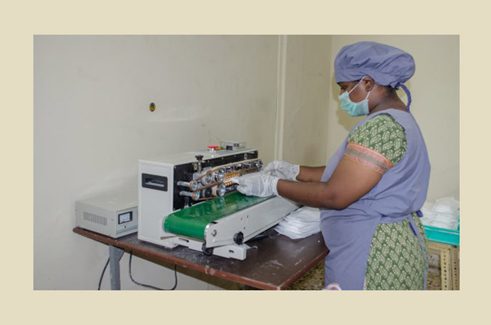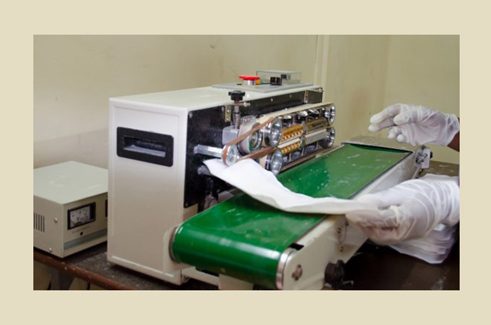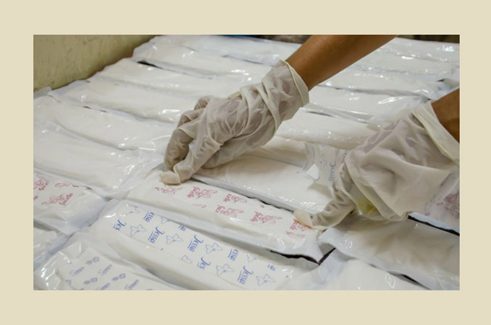women’s health
Empowerment through Sanitation

Her concern with women’s health has led medical doctor Laila Garda to become an entrepreneur. In her manufactory in Pune, India, women are earning their livelihoods creating female hygiene products.
Twelve women are working diligently in a workspace in the Hadapsar Industrial Area in Pune, India. Some are bent over tables, sorting cotton, while another woman weighs the cotton before passing it to her colleagues standing ready with moulds for making a perfect rectangle shape. These women are making sanitary napkins and earning their wages with dignity.Most of the workers come from lower strata of society, and they enjoy their work and are filled with pride when a pack of sanitary pads is ready and boxed. The person who has created the opportunity for this dignified way of living is Dr. Laila Garda – always gentle, eager to listen to any problem and keen to let her work speak on her behalf. It was her concern for young women, as well as her observation and research, that led her to set up this manufactory. She is not a businesswoman by training, but a medical doctor. However, she feels that her MBBS studies (Bachelor of Medicine and Bachelor of Surgery) from Mahatma Gandhi Institute of Medical Sciences, Sewagram, play an important role in her present work.
Countering stigmas and taboos
Dr. Garda has made it her mission to help young women and has worked relentlessly for the past 20 years in rural or urban slums. It was in 2007 that she got associated with the NGO HelpLife, a registered charitable trust initiated by Dr. Neelam Bhardwaj. The public health specialist has received national and international acclaim for using innovations and promoting appropriate technology towards the reproductive health of women in the remote and difficult areas of India.Through HelpLife, Dr. Laila Garda designed an internship focusing on differently-abled adolescent girls. There is stigma associated with disability, especially where it pertains to mobility: Children do not have a place in society because they are in wheelchairs and have trouble moving from one place to another. In India, disabled girls are mostly employed in menial jobs like papad making and pickle making, but given the right environment, they are capable of any work that an abled person can do – as Helplife has shown. The NGO has taken 18 girls under its wings and housed them in three flats in Kondhwa. They live in a pleasant atmosphere while completing their professional training. Most of the girls have received Masters degrees and even managed to secure well-paying jobs. In constant contact with these girls and working as an adolescent trainer, Dr Garda increasingly thought about helping young women overcome their distress over the many problems related to reproductive health.
During her research, she found out that a lot of girls in India use cloth instead of sanitary pads, with the main constraints being affordability and conventional, traditional myths and beliefs: It is an age-old and prevalent tradition to use cloth during menstruation. However, this cloth, although washed thoroughly, often remains damp as it is kept to dry under the remaining set of clothes. These cloths cannot be dried in the open for it is seen as taboo. The retention of moisture in the cloth thus can give rise to various fungal infections – which the next person might use (in poor families in villages these cloths are shared). Speaking about menstruation or menstrual hygiene is also taboo, even within the family. It often occurs that a mother will admonish a young girl not to speak to boys at her school or among her friends for the five days during menstruation due to the belief that during menstruation the girl will be sexually active.
Setting up a solution
Realizing the gravity of the problem for many girls and women, Dr. Garda decided to tackle this issue, stop the usage of cloth and persuade girls to use sanitary pads. With the help of HelpLife, she approached quite a lot of manufacturers, and then narrowed her search down to one in Mathura: Mr. Mahesh Khandelwal, who encouraged the initiative. After a lot of research and thinking, it was decided how exactly to produce the sanitary pads so that they would be cheap in price - almost equivalent to a cup of tea - and that the machinery to be used should be easy even for a nonprofessional. Many of the social venture partners and a group of CEOs of companies who believe in empowerment and sustainability were approached, and a selection process for funding was carried out.With the help of this financial support, a full-fledged production unit was set-up in Hadapsar in February 2016. After interviewing around 84 women who were willing to work, the neediest twelve were shortlisted. The stigma associated with anything dealing with menstruation meant that when some of the women came to know the nature of work, they thought it was degrading and felt that their family would not allow them to be part of such a project. The group of twelve that do feel confident working in this context now produce 60 packets of sanitary pads in a four-hour shift, and a pack of eight pads is sold for 20 Indian rupees (approximately 25 Euro cents).
Reasonable and very good to use
Laila Garda was recently awarded for her work in reproductive health research and awareness and is often invited to address issues about sex and sexuality in various schools and colleges. However, there is still much work to be done, as there is a prevailing need of outreach and education programmes for women in many villages. Dr Garda feels, though, that the women working in her manufactory are slowly realizing the importance of a sanitary pad and its benefits for a healthy life.Mahananda Fulsure works as a supervisor in this unit: “We trained these women, and each and every one works on a rotation so that every woman knows the whole process.’’ Shaheen Khan has four daughters and a husband who works on odd jobs. ‘’I was at first apprehensive about this work, making sanitary pads but when I realized that it is very easy and that we also can get to use them, I decided to stay in this job. I often sell them to my neighbors too. It is reasonable and very good to use.’’







